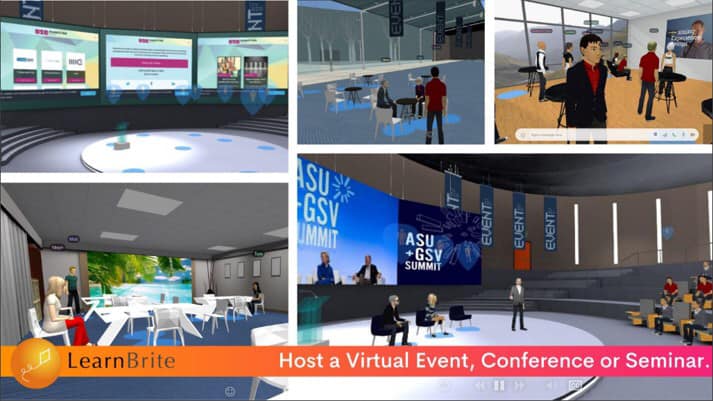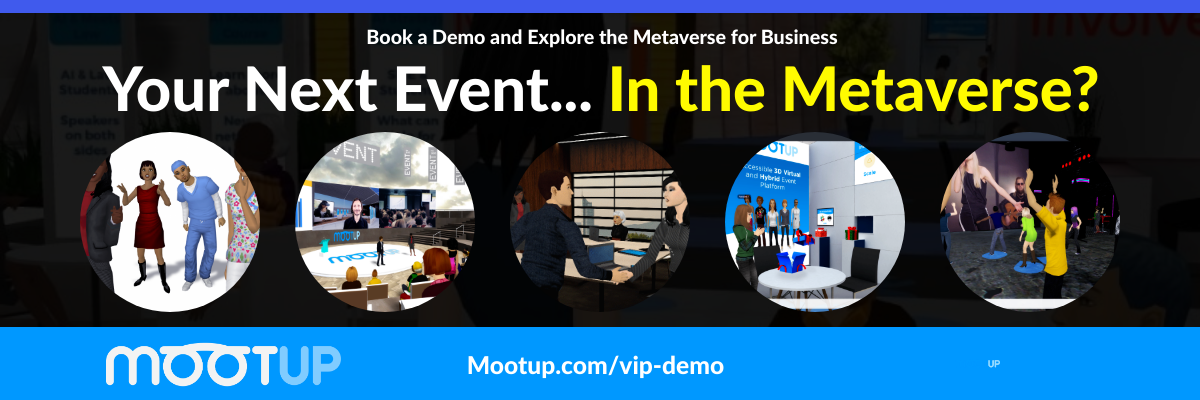Are you looking to make the most of your virtual events? With virtual event tools, it’s possible to create engaging and interactive experiences that can rival in-person gatherings. With so many options, how can you ensure that the virtual event tool you select best suits your needs? In this blog post, we’ll explore what makes a great virtual event tool, best practices for utilizing them effectively, tips on maximizing engagement, and security considerations when using them. By understanding all aspects of virtual event tools, you can produce successful digital events time after time.
Table of Contents:
- How to Choose the Right Virtual Event Tool for Your Needs
- Best Practices for Utilizing Virtual Event Tools
- Tips for Maximizing Engagement with Virtual Events
- Security Considerations When Using Virtual Event Tools
- FAQs about Virtual Event Tools
- Conclusion
How to Choose the Right Virtual Event Tool for Your Needs
Choosing the right virtual event tool for your needs is an important decision that requires careful consideration. Understanding your goals and objectives, researching different options, evaluating features and functionality, and assessing cost and support services before selecting are essential.
When identifying your goals and objectives, it’s essential to consider what you need from the virtual event tool. Are you looking for something simple or more complex? Do you need advanced features such as streaming capabilities or interactive elements? Answering these questions will help narrow down potential solutions that meet your requirements.
Once you have identified your needs, it is essential to research different options to make an informed decision. Start by exploring online reviews of popular tools available on the market today. You can also seek advice from other experienced professionals who have utilized similar tools to determine which one was most beneficial for them. Before deciding on a platform, it’s helpful to take advantage of free trials offered by vendors to assess their software and make an informed decision.
When evaluating features and functionality of potential solutions, be sure to look at things like scalability – does it allow multiple users access simultaneously? Are there built-in security measures such as two-factor authentication? Does it integrate with existing systems or third-party applications? These are all factors worth considering when selecting a virtual event platform that fits within budget constraints while providing necessary functionalities desired by attendees.
By taking the time to identify your goals and objectives, researching different options, evaluating features and functionality, and assessing cost and support services, you can make an informed decision when choosing a virtual event tool. With these best practices in mind for utilizing virtual event tools, such as establishing clear communication protocols, creating engaging content, leveraging automation features, and monitoring performance metrics, you will be well on your way to hosting successful events.
Key Takeaway: After carefully assessing your goals and objectives, researching the market for suitable virtual event tools is essential. Evaluating features, functionality, cost, and support services can help you decide which platform best meets your needs while remaining within budget constraints.
Best Practices for Utilizing Virtual Event Tools
Establishing clear communication protocols is essential for successful events when utilizing virtual event tools. This includes setting expectations with attendees and providing timely updates about changes or developments in the event schedule. In addition, creating a dedicated communication platform can facilitate the flow of information to all parties involved.
Creating engaging content is critical when leveraging virtual event tools. Consider incorporating interactive elements like polls, quizzes, Q&As, and surveys into your presentations to capture your audience’s attention and keep them engaged. Containing multimedia such as videos or audio clips can also be effective in helping to break up long stretches of text-based material while adding visual interest to your presentation.
Leveraging automation features available through virtual event platforms can save time by automating tedious tasks like registration processes or sending out reminders before the start of each session. Automation features can also be used to collect data from participants, which can be analyzed later on for insights into their behavior during the event.

Finally, monitoring performance metrics is essential for assessing how well a virtual event went overall and identifying areas where improvements could be made in future events. Metrics such as attendance rate, completion rate (for online courses), engagement level (measured via interactions), and satisfaction ratings are all useful indicators of success that should be tracked over time so that any issues can be identified and addressed promptly.
By following the best practices outlined above, event professionals can ensure their virtual events are successful and engaging. To further maximize engagement with these events, it is essential to consider additional tips such as personalizing the experience, offering incentives and rewards, encouraging interaction and participation, and incorporating gamification elements.
Mootup runs evergreen experiences from “always-on” events that continue to delight attendees and generate sponsor leads on autopilot to immersive meetings that make traditional Zoom sessions look like communicating with a telegraph.
# Virtual events don’t have to be boring. Incorporate interactive elements, leverage automation & monitor performance metrics for successful events. #EventPlanningClick to Tweet
Tips for Maximizing Engagement with Virtual Events
To maximize engagement, personalize the experience for each attendee by tailoring content to their interests and needs. This can be done by creating personalized content that speaks directly to their interests and needs. By offering attendees the opportunity to indicate their preferences through a survey, you can tailor the event’s content and activities to their interests. Additionally, providing attendees with personalized opportunities to interact with speakers or sponsors can help foster an engaging atmosphere where participants feel appreciated and connected.
Offer incentives and rewards to boost attendance at virtual events and engagement throughout, such as discounts or access to exclusive content. Consider offering prizes for participation, such as discounts on products or services related to your industry or access to exclusive content available only through your event platform. You could also offer discounts on future tickets if attendees share their experiences on social media channels such as Twitter or Instagram using specific hashtags associated with your event brand.
Encourage Interaction and Participation:
Virtual events should provide plenty of opportunities for interaction between presenters, sponsors, exhibitors, and attendees alike so that everyone feels connected regardless of physical location. Consider incorporating interactive elements into presentations such as polls, surveys, quizzes, etc., making them more exciting and allowing participants to engage with each other in real time without leaving their homes or offices. Additionally, you may consider hosting online networking sessions after keynotes/sessions where people can connect over shared interests while learning from each other’s perspectives in a safe space away from prying eyes.
Incorporating gamification elements into virtual events is another excellent way to boost engagement levels among attendees while making it fun at the same time. Games such as trivia contests based around industry knowledge, scavenger hunts, live leaderboards, and point systems are all excellent ways to keep participants engaged throughout your entire event, no matter how long it runs. These games add value and provide tangible rewards, making attending even more appealing; plus, who doesn’t love winning something?
By following the tips outlined in this article, event industry professionals can create a more engaging virtual experience for their attendees. Security considerations should also be considered when utilizing virtual event tools to ensure that all data is secure and private.
Key Takeaway: Virtual events should be personalized, incentivized, and interactive to maximize engagement. Gamification elements such as trivia contests, scavenger hunts, and leaderboards add fun while providing tangible rewards that keep participants engaged throughout the event – making it a win-win situation.
Security Considerations When Using Virtual Event Tools
When using virtual event tools, security is of paramount importance. Event industry professionals must know the data privacy regulations and access controls necessary to protect sensitive information. To ensure the responsible and secure handling of personal data, organizations in the EU must adhere to GDPR (General Data Protection Regulation). Access controls can help restrict who has access to certain information or areas within a platform. Encryption technologies such as TLS (Transport Layer Security) allow secure communications between two systems over a network connection, protecting any confidential information being shared during an event from potentially malicious actors. Finally, ensuring network security through firewalls can help prevent unauthorized access to the system hosting your virtual events while reducing the risk of malware or other malicious attacks on your plans. By taking the necessary precautions, you can ensure that your affairs remain secure for all involved.
Secure your virtual events with data privacy regulations, access controls, encryption technologies & network security. #VirtualEvents #EventSecurityClick to Tweet
FAQs about Virtual Event Tools
How do virtual event platforms work?
Virtual event platforms are designed to provide a virtual space for hosting events. They enable organizers to create and manage custom-branded experiences, including 3D environments, interactive features, streaming audio/video content, live chat sessions, and more. These platforms allow attendees to connect in real-time while attending the event virtually. They can also be used as a platform for hybrid events that mix physical attendance with online participation.
What is the best platform for a virtual event?
The best platform for virtual events provides a comprehensive suite of tools to create, manage and host an event. It should include custom branding, video streaming capabilities, interactive content options like polls and surveys, analytics and reporting tools to measure success metrics, support for multiple languages/currencies/time zones, secure payment processing systems, and easy integration with other platforms. Additionally, it should be user-friendly, so non-technical users can quickly learn how to use the forum without prior experience producing or hosting virtual events.
How do you make virtual events more interactive?
Virtual events can be made more interactive by leveraging various technologies and features. For example, virtual event platforms allow users to create custom experiences with interactive elements such as polls, quizzes, Q&A sessions, live chats, and breakout rooms. To further engage attendees, virtual events can incorporate immersive 3D environments and gamification mechanics to create an enjoyable experience. Finally, integrating gamification mechanics into an event will increase engagement and make it more enjoyable for all participants.
What is the purpose of a virtual event?
The purpose of virtual events is to provide a digital platform for attendees to engage in meaningful conversations and experiences. Virtual events offer a way for people to connect remotely, replicating the physical event experience without being physically present. Virtual events also allow organizers greater flexibility in scheduling, cost savings, and access control compared to traditional events. With virtual event technology becoming increasingly sophisticated, it has become possible for organizers and participants alike to create immersive environments that can replicate real-world interactions within a safe online space.
Conclusion
Virtual event tools are invaluable for creating and hosting engaging virtual events. When selecting the right tool, consider your budget, technical requirements, security needs, and desired features. Implementing best practices, such as providing interactive elements to increase engagement, will ensure a successful event experience. With careful planning and consideration of all aspects of virtual event tools, you can create memorable experiences that leave lasting impressions on attendees.
The MootUp platform allows you to prepare your Metaverse event technology infrastructure for the future. The browser-based platform offers effortless access to all attendees, regardless of their device, including smartphones, tablets, laptops, and VR/AR headsets. Best of all, no downloads or software installations are required to get started.
Take your virtual and hybrid events to the next level with MootUp! Our no-code platform offers an easy way to produce and host immersive experiences in the metaverse.

